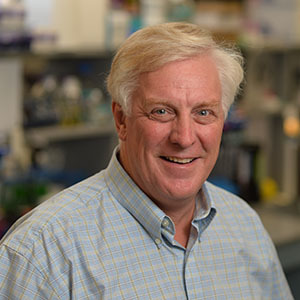David R. Hyde

Rev. Howard J. Kenna, C.S.C., Memorial Director of the Center for Zebrafish Research, Department of Biological Sciences
Phone: 574-631-8054
Office: 027 Galvin Life Sciences Center
David R. Hyde’s lab studies how damaged or dying adult nerve cells in the zebrafish retina are regenerated. Injury to the retina triggers a group of retinal cells, called Muller glial cells, to act like neuronal stem cells and generate neuronal progenitor cells. These neuronal progenitors migrate to the damaged retinal region and differentiate into the missing neurons so that the blinded fish can again see. This regeneration is so specific that only the missing neurons are regenerated and only in the damaged area.
Most vertebrates, including humans, also possess Muller glial cells. However, they are unable to regenerate damaged neurons in the retina. By studying the mechanism of zebrafish retinal regeneration, Prof. Hyde and his staff hope to find ways to induce the human Muller glia to initiate a retinal regeneration response. Recently, Prof. Hyde’s group identified several key molecules that are necessary to initiate the regeneration response from Muller glia. If this can be successfully translated to humans, it could lead to treatments that repair the damage in a variety of different human retinal diseases, such as macular degeneration, retinitis pigmentosa, glaucoma, and diabetic retinopathy. Furthermore, adult neuronal stem cells, which are similar to Muller glia, are also in the brain. This suggests that a regeneration response may be induced that will restore neurons in specific brain areas that are affected in a variety of diseases, such as in Parkinson’s disease, Alzheimer’s disease, or spinal cord injuries.
Fighting to Restore Vision
Research by David R. Hyde uses adult stem cells in zebrafish to study how neurons regenerate. The work holds promise for treatments for such human problems as glaucoma and macular degeneration in the eyes, Alzheimers and Parkinsons in the brain, and even spinal cord injuries.
Can Adult Stem Cells Regenerate the Damaged Nervous System?
Presented by David R. Hyde at the Notre Dame Inaugural Workshop on Adult and Alternative Forms of Stem Cell Research: Public Lectures, 2011.
Would you like to support Prof. Hyde's Research?